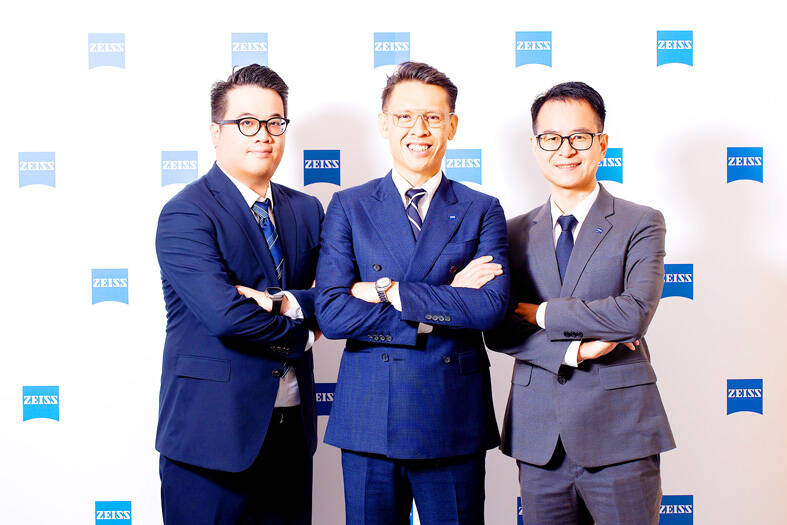Zeiss plans to unveil a new investment project next month at the Computex Taipei trade show, aiming to elevate Taiwan’s position as a global center for artificial intelligence (AI) technology, company executives said yesterday.
The investment would be the second leg of the German company’s 10-year plan to invest NT$10 billion (US$310.3 million) in Taiwan. Zeiss initiated the plan last year by launching a NT$300 million innovation center at the Hsinchu Science Park (新竹科學園區).
The new project would “significantly increase Taiwan’s research-and-development [R&D] capabilities,” Zeiss Taiwan head Cheong Peng Tat (章平達) said at a news briefing in Taipei.

Photo courtesy of Zeiss Taiwan
Zeiss aims to bring the world’s most advanced process technologies, AI solutions and resources to Taiwan, making the country an optimal location for international companies to undertake research and developments projects and establish new product introduction centers for AI products, said Clive Yen (嚴子登), head of Zeiss Taiwan’s industrial quality solutions unit.
Taiwan would evolve into a key AI technology hub, with failure analysis, process validation and all sorts of quality control measures to be carried out, he said.
The major technological challenges faced by AI supply chains lie in printed circuit boards, liquid-cooling systems and server rack assembly, due to increasing technological complexity and thermal management issues, he added.
Zeiss is set to showcase its new “Zeiss Metrotom,” an industrial computed tomography system for measuring and inspecting complete components made of plastic or light metal, at Computex, with a focus on AI server products, it said.
Aside from computed tomography solutions, Zeiss also saw increasing demand for its research microscopy solutions such as high-resolution 3D X-ray microscopy solutions to help customers conduct fault isolation, failure analysis and yield enhancement. The company’s microscopy solutions are used a variety of areas such as advanced chip-on-wafer-on-substrate (CoWoS) packaging technology, which is adopted to package AI chips.
Due to strong customer demand, Zeiss’s research microscopy solutions (RMS) business group has enjoyed more than 50 percent annual growth over the past three years, RMS head Henry Cai (蔡慧) said yesterday. He expects the growth momentum to carry into the next few years.
To cope with business expansion and rising demand for its equipment and services, the company plans to increase its local headcount by about 12 percent, or 50 new employees, this year, Cheong said.
Zeiss Taiwan’s workforce has grown rapidly, reaching 400 employees today, up from 40 in 2018, the company said.
Over the past five years, Zeiss Taiwan has expanded across five business units: consumer markets, medical technology, semiconductor manufacturing, microscope solutions and industrial quality solutions, it added.

Taiwanese suppliers to Taiwan Semiconductor Manufacturing Co. (TSMC, 台積電) are expected to follow the contract chipmaker’s step to invest in the US, but their relocation may be seven to eight years away, Minister of Economic Affairs J.W. Kuo (郭智輝) said yesterday. When asked by opposition Chinese Nationalist Party (KMT) Legislator Niu Hsu-ting (牛煦庭) in the legislature about growing concerns that TSMC’s huge investments in the US will prompt its suppliers to follow suit, Kuo said based on the chipmaker’s current limited production volume, it is unlikely to lead its supply chain to go there for now. “Unless TSMC completes its planned six

Intel Corp has named Tasha Chuang (莊蓓瑜) to lead Intel Taiwan in a bid to reinforce relations between the company and its Taiwanese partners. The appointment of Chuang as general manager for Intel Taiwan takes effect on Thursday, the firm said in a statement yesterday. Chuang is to lead her team in Taiwan to pursue product development and sales growth in an effort to reinforce the company’s ties with its partners and clients, Intel said. Chuang was previously in charge of managing Intel’s ties with leading Taiwanese PC brand Asustek Computer Inc (華碩), which included helping Asustek strengthen its global businesses, the company

Power supply and electronic components maker Delta Electronics Inc (台達電) yesterday said second-quarter revenue is expected to surpass the first quarter, which rose 30 percent year-on-year to NT$118.92 billion (US$3.71 billion). Revenue this quarter is likely to grow, as US clients have front-loaded orders ahead of US President Donald Trump’s planned tariffs on Taiwanese goods, Delta chairman Ping Cheng (鄭平) said at an earnings conference in Taipei, referring to the 90-day pause in tariff implementation Trump announced on April 9. While situations in the third and fourth quarters remain unclear, “We will not halt our long-term deployments and do not plan to

The New Taiwan dollar and Taiwanese stocks surged on signs that trade tensions between the world’s top two economies might start easing and as US tech earnings boosted the outlook of the nation’s semiconductor exports. The NT dollar strengthened as much as 3.8 percent versus the US dollar to 30.815, the biggest intraday gain since January 2011, closing at NT$31.064. The benchmark TAIEX jumped 2.73 percent to outperform the region’s equity gauges. Outlook for global trade improved after China said it is assessing possible trade talks with the US, providing a boost for the nation’s currency and shares. As the NT dollar